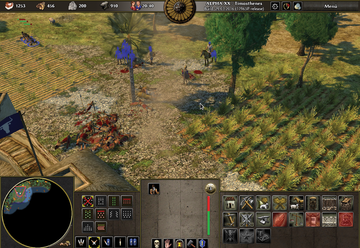3D games with and without Steam: Ark, Cities: Skylines, and 0 A.D.
|
Cities: Skylines – The Mayor's Office
Cities: Skylines is a complex city-building game that has demanding hardware requirements. It is somewhat more complicated to play but less adventuresome than ARK. Like the classic game with a similar name, the goal is to establish a city in a landscape of choice and build it out beginning with an exit on an Interstate. The inhabitants pay taxes that can be used to construct all kinds of power stations, streets, police stations, and other infrastructure. This then attracts more inhabitants to the city who generate more revenue, thus making it possible for the city to grow in size.
In addition to the game itself, the equipment includes editors for scenarios and gameplay elements. The game creator, Colossal Order, offers Cities: Skylines via the publisher Paradox Interactive, who also runs the community portal (Figure 6).
 Figure 6: From the game's Home screen, you set up an account on the Paradox Interactive portal. On the right, you can see the long list of Steam expansions available for the game.
Figure 6: From the game's Home screen, you set up an account on the Paradox Interactive portal. On the right, you can see the long list of Steam expansions available for the game.
The many different possibilities are so well structured that even a first grader can have fun constructing a city. However, children who want to play should be able to read, because some of the ingenuity of the game depends on being able to comprehend detailed explanations provided in the tool panels. A player also needs to pay attention to the chat messages sent by inhabitants of the city to the player, their mayor. These communications report successes, but they also point to problems that are easy to overlook in the complex general overview (Figure 7).
 Figure 7: A municipal finance department is one of the many administrative gameplay elements found in Cities: Skyliness.
Figure 7: A municipal finance department is one of the many administrative gameplay elements found in Cities: Skyliness.
Cities: Skylines did not run well at all on a laptop. Just the start time itself lasted as long as a quarter of an hour. With a desktop PC, on the other hand, the game booted in testing without any problems after four or five minutes – much like ARK. The camera view affords an especially impressive perspective, in which the player can observe the city with photorealistic graphics.
A good city planner can begin to govern a city with 10,000 inhabitants after just 10 to 15 hours of play time, bearing in mind that fascinating construction and infrastructure elements continue to increase in number. Of course, all of this comes with interesting problems, such as environmental damage, over-indebtedness, and similar issues, thus challenging the intellectual capabilities of the game players.
Cities can be expanded with numerous mods available from the Steam workshop. In addition to many details, such as snow and rain, you have terrible catastrophes that include a volcanic eruption.
0 A.D. – Classical Antiquity in Modern Times
Unlike the two Steam titles, the open source game 0 A.D., developed by Wildfire Games, at first looks like it lacks complexity. However, first appearances can be deceiving. This is not a project put together by a hobbyist during off hours. In fact, 0 A.D. offers the most important of the properties usually found in professionally developed games: The concept is well thought out, and it has been carefully implemented. Nothing about 0 A.D. is purely experimental. Everything that has been implemented works perfectly and makes a thoroughly professional impression.
On their mailing list, the developers discuss things like the appearance of the sandals worn by Roman Legionaires some 2,050 years, and whether the shooting range of the Iberian slingers has been accurately portrayed when they are presented in the game as a deadly danger for advancing Persian warriors. Even the historical names given to the champion non-playable characters (NPCs) in the game are unknown to most because Asterix , a Franco-Belgian comic that ran from 1959 to 2010 [12], is the sole source for much of the knowledge about this time period. The attention to detail is fun for fans of classical history, and contributes significantly to the game's rich atmosphere.
The basic themes of the game are economy and conflict. Ethnic groups like Persians, Celtic tribes, Greeks, and Indians construct houses, fields, and forts in unspoiled environments according to legendary and historical records. They then have to struggle against other groups controlled either by online players or from the remarkably more powerful artificial intelligence (AI; Figure 8). Testing did not reveal any technical problems, and 0 A.D. was the only game tested that worked well and delivered well-rendered graphics on a laptop with a 600 generation Nvidia card. The game did slow down noticeably with scenarios that had more than three game partitions as soon as the number of NPCs was greater than 500.
0 A.D. is definitely less spectacular and less complex than the two Steam candidates, but I had no complaints in terms of how it handled. The current version comes with a conquest mode that makes the battles between the groups more interesting and adds excitement to the clashes. The website contains directions for building mods and scenarios and instructions for character design in the Blender graphics program (Figure 9).
« Previous 1 2 3 Next »
Buy this article as PDF
Pages: 8
(incl. VAT)








